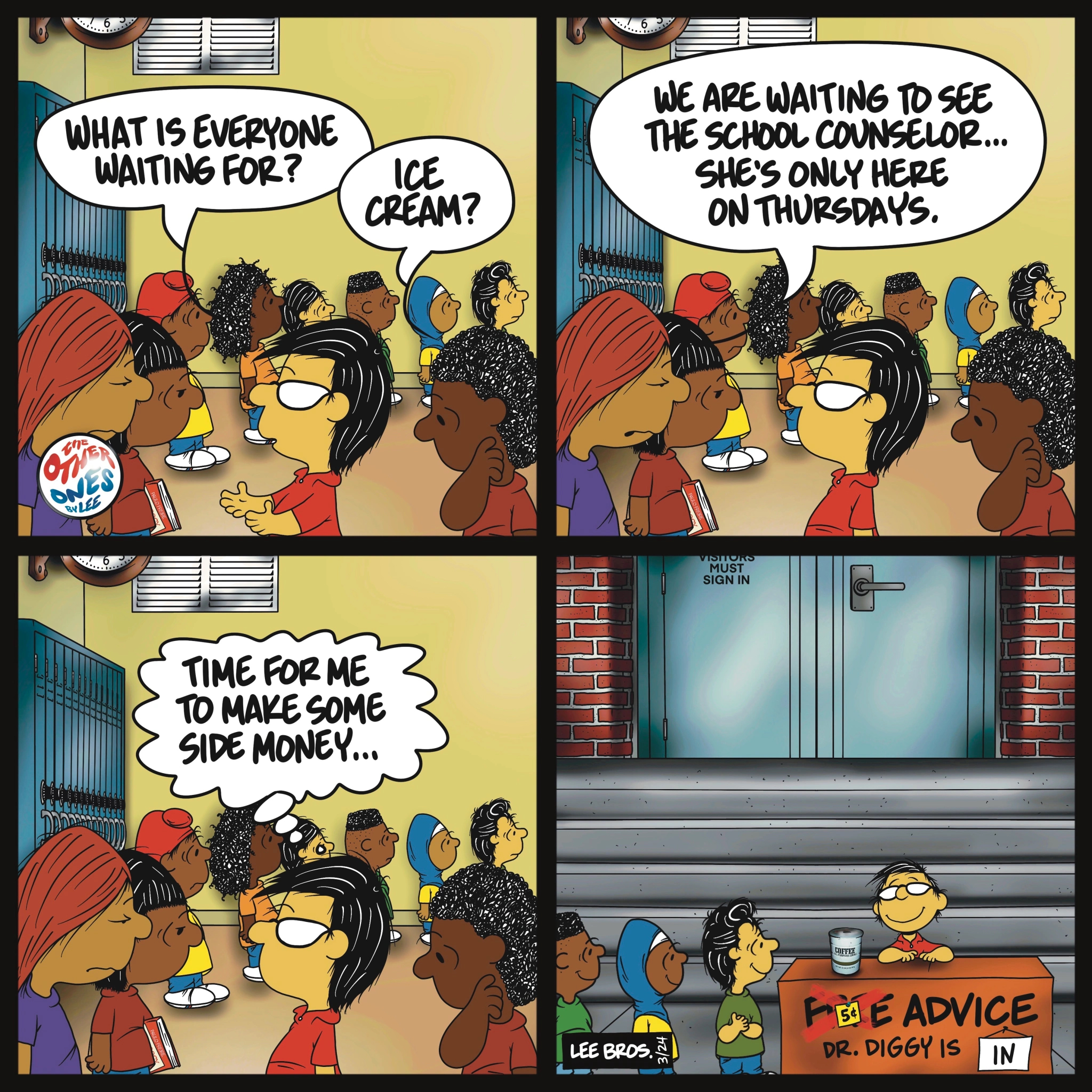Image: “The Other Ones” online comic strip by Martin and Richard Lee from March 23, 2022. (Courtesy of “The Other Ones” by Lee)
Minneapolis-based Rich Lee, an award-winning counseling psychology researcher, Distinguished McKnight University Professor and comic strip co-creator, takes aim at the status quo wherever he can.
By Bel Moran
Rich Lee, a University of Minnesota professor of counseling psychology and award-winning researcher, has always upset the status quo.
As a young Asian American man in a majority white, Catholic high school, he questioned rules and lessons in class. In his research, he challenges the stigma of mental health among Asian American communities.
Now, in his spare time, Lee is teaming up with his brother on a long-distance collaboration to channel his research ideas into a satirical comic that uplifts marginalized identities and upends the idea of a Charlie Brown childhood.
Although Lee is a distinguished scholar professionally, he devotes a significant amount of his free time to co-creating “The Other Ones,” a satirical comic strip that works to explain the complex societal issues he researches, with his older brother, Martin Lee, who illustrates.
“To me, making the comic is a way to visually embody my thoughts and feelings and my scholarship so that it reaches a broader audience than just other academics reading journal articles,” Rich Lee said.
The brothers began creating their comic in response to the global turmoil that uprooted the lives of many in 2020. The year the pandemic began brought on a slew of bad headlines, including the murder of George Floyd and the social reckoning that followed, a sharp uptick in violence against Asian American communities and the daily stressors of life in quarantine.
“The Other Ones” embodies a style similar to Charles Schulz’s “The Peanuts,” though they make a point of including characters that were historically omitted from the narrative.
“It’s all the stuff that was happening to the BIPOC children while Lucy was pulling the football away from Charlie Brown,” Martin Lee said. “You know, Linus is waiting for the Great Pumpkin and while all those things are happening, there are other children having experiences.”
“It’s important work,” Rich Lee said, “because we know so little about those experiences, and there’s a lot we can learn about how people navigate the world, how people incorporate diverse life experiences. I think that’s really important when we think about how increasingly diverse and global our world is.
Diggy, one of the inquisitive main characters throughout “The Other Ones,”, is modeled after Rich Lee. “We try to balance the seriousness with some humor or levity,” he said. “That would have been true when I was a kid, to be making the joke or craving that, getting that attention.”
Though the brothers live almost two thousand miles apart — Martin Lee in Pensacola, Florida, and Rich Lee in Minneapolis —- they text constantly about current events. Many of the comics delve into complex societal issues and explain them in ways even a child could understand, making them an ideal tool for education or the perfect addition to breakfast.
“For me and Rich, every morning, we’d run down and get the newspaper and read the comics, you know, that was our thing. And now people are scrolling through and it’s become part of their ritual. So it’s giving people something to think about, you know, whether they agree with us or not,” Martin Lee said.
Rich Lee said he never planned on becoming a psychologist, but a natural proclivity for questioning prompted him to change his mind. In high school, he wanted to become a guidance counselor, like the ones who supported him when he was often sent to their office after vocally disagreeing with teachers.
“I was also going through just a lot personally in my life, in terms of coming to sort of a reckoning around being Asian American and being a racial minority in my school,” he said. His guidance counselors inspired him, but college is what started his path to becoming an educator.
“I had a Korean American professor in psychology at my college, and he was doing really cool, radical work and I thought, ‘Oh, that’s cool. I could get paid to do this,’” Rich Lee said. “I can go to work and get paid to ask and answer questions that I would be asking regardless of whether I was in this job.”
Even mental health researchers and professional psychologists aren’t immune to burnout. Rich Lee staves off the pressure by seeking support from colleagues, friends and family. “It’s hard when you are by yourself doing the work,” he said. “It’s more rewarding and enjoyable when you can do it in solidarity with others.”
He said he also finds it rewarding to mentor students and to think about the impact that will have.
“I’m helping create the next generation of psychologists, particularly those who come from other minoritized communities, who are often underrepresented or not at all represented in the profession,” he said.
The brothers have big hopes for the future of their work, the biggest being the dream of publishing daily in newspapers across the country. For now, they are content with posting their work online for all to see.
“This has been a way for us to both stay connected as family, but also do something that we know is reaching the broader public and bringing up issues and conversations that hopefully are going to do some good,” Rich Lee said.
